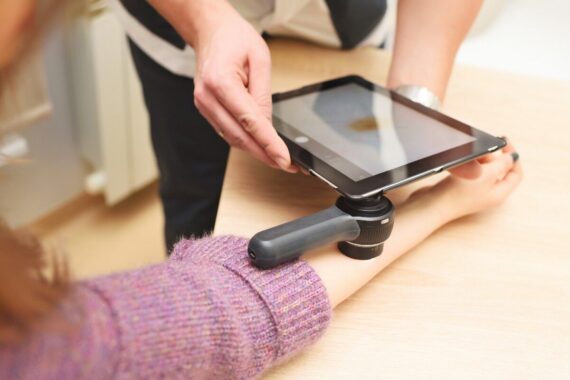Rural GP practices will get access to new teledermatology technology to speed up diagnosis for patients with skin cancer, NHS England has announced.
Under the plans, GPs in rural areas and clinicians in the 108 community diagnostic centres (CDCs) across England will take images with a dermatoscope to be reviewed remotely by a specialist.
The technology consists of ‘a small lens the size of a 50p piece that can be attached to a phone camera’ and can ‘double’ the number of patients a specialist dermatologist can review in one day, NHS England said.
Around 15% of trusts currently use the technology but it is being expanded to all areas by July.
It follows data which shows that in some hospitals where teledermatology is already in use, patients are being diagnosed and treated for skin cancer within two months of an urgent GP referral.
The use of dermatoscopes is being expanded across GP practices, the announcement said, to ‘support people living in more in rural communities to get a faster diagnosis without having to travel for a specialist appointment or avoid the requirement to attend a specialist’.
Referrals for skin cancer checks rose by 9% last year to 600,000 and twice as many patients are referred than a decade ago, figures show.
The NHS is also trialling artificial intelligence technology to assess skin lesions within seconds for the presence of cancer, health officials announced.
In the first instance, the Deep Ensemble for the Recognition of Malignancy (DERM), will be used alongside clinician assessment, but it is being assessed to see if it can provide faster and more accurate skin cancer detection.
Early testing phases reported helping to avoid around 10,000 unneeded face-to-face appointments, NHS England said.
In April, NHS England wrote to hospitals to ask that diagnostic test results for suspected cancer be turned around within 10 days.
A letter sent to local health leaders requested priority was given to diagnostic tests like MRI scans for cancer in CDCs or to free up capacity within hospitals by moving elective activity into the centres.
NHS chief executive Amanda Pritchard said record numbers of people are being checked and treated for cancer with a higher proportion being diagnosed at an early stage.
‘There is no denying that increased demand has placed huge pressure on services, but championing the use of digital technology and new ways of working is key to reducing waits and is exactly why we are accelerating the use of teledermatology – it is a small piece of kit that has the potential to speed up diagnosis and treatment for tens of thousands with skin cancer.
‘We are going a step further even and expanding the use of artificial intelligence lenses in teldermatology to diagnose skin cancers, and this is proving highly effective in areas that have trialled the technology so far.’
Health minister Helen Whately added: ‘This technology allows dermatologists to see double the number of patients in a day and by rolling it out across community diagnostic centres this will save lives.’
Dr Tom While, a GP from Somerset, said being able to get a swift and specialist opinion on a skin lesion or rash often negates the need to refer the patient to hospital.
‘This not only reduces waiting lists, but strongly benefits my patients who live in rural areas, saving them from long unnecessary journeys.’
He added: ‘If a patient does need to be referred on to a specialist, then the teledermatology service helps to streamline that process, ensuring the patient is seen in the correct clinic at the right time – it’s a fantastic service and an asset to rural general practice, and hard to imagine working without it.’
Professor Azeem Majeed, a GP and professor of primary care and public health at Imperial College London, said: ‘I have had patients who have used NHS teledermatology services with good outcomes but this has been via hospital medical photography departments rather than the new community diagnostic centres.
‘If the imaging services can be offered in community diagnostic centres that would be helpful if it speeds up patient flows as there are often long waiting time for NHS dermatology appointments.’
He added: ‘I would be more cautious about offering these services in GP practices though until issues such as funding, training and workload were addressed.’
The Government announced this week that its ‘one stop shop’ community diagnostics centres (CDCs) have to date delivered four million extra checks for conditions such as cancers and lung disease.
Eight additional centres are due to open before the end of the year, including two in Scarborough and one each in Clacton, Plymouth, Oldham, North Manchester, Grimsby and Hull and East Riding.
The Government said this means it is ‘showing progress’ on its pledge to open 160 CDCs by March 2025.
Pulse October survey
Take our July 2025 survey to potentially win £1.000 worth of tokens















Not that inspiring, had same for ages in my patch.
As aside instead of putting service in CDC why not put in the GP surgery? Means patient saves having to drive to Hub??
Teledermatology is less about the diagnosis of cancers, and more about positive diagnosis of non-cancer, to stop the clogging of the pathway.
More use for odd lesions and rashes that the GP doesn’t think needs a journey to the big place.
Whilst our Consultant colleagues can’t wait to do twice the number of patients a day, I’m sure, without capacity for the biopsies and accurate pathology follow up, it’s the usual sideways deckchair motion.
Sounds great though. We actually do have a good service at this in my area and routine waits for new referrals now only about 85 weeks…. Gamechanger.